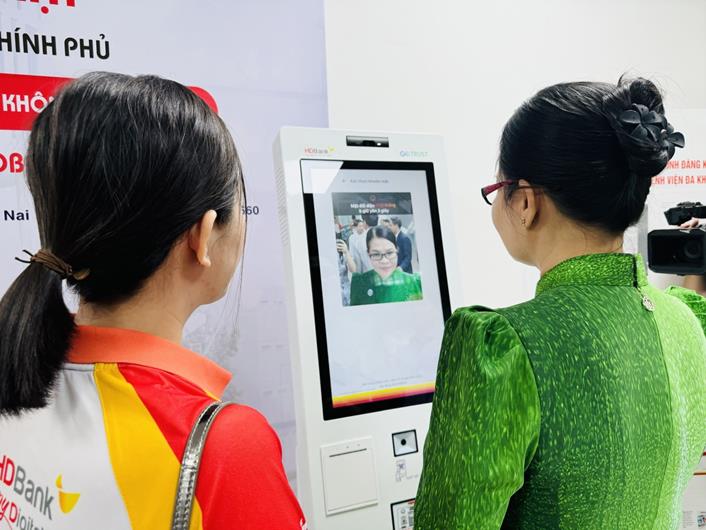(News Portal – Dong Nai) - Smart healthcare is built upon three main pillars: disease prevention, intelligent healthcare services; smart diagnosis and treatment; and intelligent health management. Despite encountering numerous challenges, the healthcare sector in Dong Nai is resolutely committed to successfully implementing smart healthcare initiatives to further enhance the efficiency of preventive care, diagnosis, and treatment services.
Application of Technology in Diagnosis and Treatment
Smart healthcare integrates information technology and artificial intelligence (AI) to enhance automation in medical activities. Medical devices, patient data, and healthcare systems are interconnected via the internet to provide more effective healthcare information and services.
In the past, patients had to bring identification, paper health insurance cards, and medical records, then wait in line for their turn to see a doctor. However, this is no longer the case as many hospitals in the province have implemented automatic ticket dispensing machines. Now, when patients arrive at the hospital, they simply need to present their chip-enabled identity card (which includes integrated health insurance information) or use the VNeID app on their smartphones to receive a consultation ticket without long waits.

Healthcare staff updating patient treatment information in the electronic system.
Dr. Le Thi Phuong Tram, Deputy Director of Dong Nai General Hospital, stated that since the hospital implemented the One Card system for both registration and payment, the congestion in registration and payment processes has significantly decreased. Additionally, the hospital has introduced dynamic QR code payment options, allowing patients to use banking apps on their smartphones to scan the QR codes provided by hospital staff. These dynamic QR codes contain all necessary information about the medical services the patient receives, along with the corresponding fees.
“Patients no longer have to wait in line or use cash, which reduces the risk of theft, loss of money, or payment errors. The transaction details are clear and accurate, contributing significantly to the hospital's management efforts," Dr. Tram remarked.

Thong Nhat General Hospital has also adopted Smart Kiosk systems and dynamic QR code payments for patient registration and fee settlement.
Deputy Director in charge of Thong Nhat General Hospital, Nguyen Thi Kim Loan, stated that the chip-enabled identity information and patients' facial images are stored throughout the registration and treatment process. This transition shifts patient management from manual, paper-based methods to modern, technology-driven approaches, allowing the hospital to save time, effort, and resources in building and operating specialized databases. It also lays a crucial foundation for the hospital to implement electronic medical records in the near future.
Mr. Nguyen Hoang Anh, a resident of Tan Bien Ward in Bien Hoa City, shared that in the past, he often had to wait for long periods, sometimes pushing and shoving to register for medical consultations, which was quite exhausting. Now, with the implementation of automatic registration systems in hospitals, those frustrations are a thing of the past, considerably shortening the time needed for consultations and fee payments.
Commitment to a Paperless Hospital Model
Aiming for a paperless hospital model, the healthcare sector in Dong Nai has successfully implemented electronic medical records at Long Khanh Regional General Hospital. Dr. Phan Van Huyen, Director of Long Khanh Regional General Hospital, reported that after four years of implementation, the hospital is currently storing over 28,000 electronic medical records, with approximately 3 TB of data. Each medical record is expected to be retained for 10 to 15 years.
Dr. Ha Thi Hong Thanh, Head of the Pediatrics Department at Long Khanh Regional General Hospital, noted that using electronic medical records offers numerous benefits for doctors. It allows for quicker daily documentation of patient progress without the need to manually rewrite all previous information as with paper records. Additionally, doctors' prescriptions are clearer, reducing the likelihood of errors due to illegible handwriting. Notably, all patient medical histories and treatment records are stored in the system, enabling doctors to easily access the information without wasting time.
Director of the Department of Health, Le Quang Trung, affirmed that applying information technology and AI enables managers to gain a comprehensive overview of the entire healthcare sector. This includes insights into disease models and future health trends, which help managers make more accurate and timely decisions.

Doctor examining a child at
a hospital in the province.
For hospitals, the benefits are clear. Support from information technology and AI will enhance diagnostic accuracy while reducing the workload on healthcare staff, thereby improving the quality of healthcare services for the community.
According to the Department of Health leadership, in addition to electronic medical records and smart kiosks, the healthcare sector is continuing to collaborate with various units to provide other modern services related to cashless payments and the application of AI in imaging diagnostics. Initially, the healthcare sector will pilot AI applications at Long Khanh Regional General Hospital, starting with software to support diagnosis and treatment for patients with lung diseases. If this project succeeds, it will be expanded throughout the province. Despite facing many challenges, particularly regarding funding, the healthcare sector remains committed to progressing step by step.
Currently, the Dong Nai healthcare sector is focusing on implementing five digital transformation projects. The most notable is the Terminal Equipment Project. The Remote Consultation Project is also underway, based on existing infrastructure, with the goal of completion by 2025. The third and fourth projects relate to the establishment of healthcare sector databases. For the electronic medical record project, the healthcare sector plans to continue investing in four facilities: Dong Nai General Hospital, Thong Nhat General Hospital, Dong Nai Children's Hospital, and Cam My District Health Center.